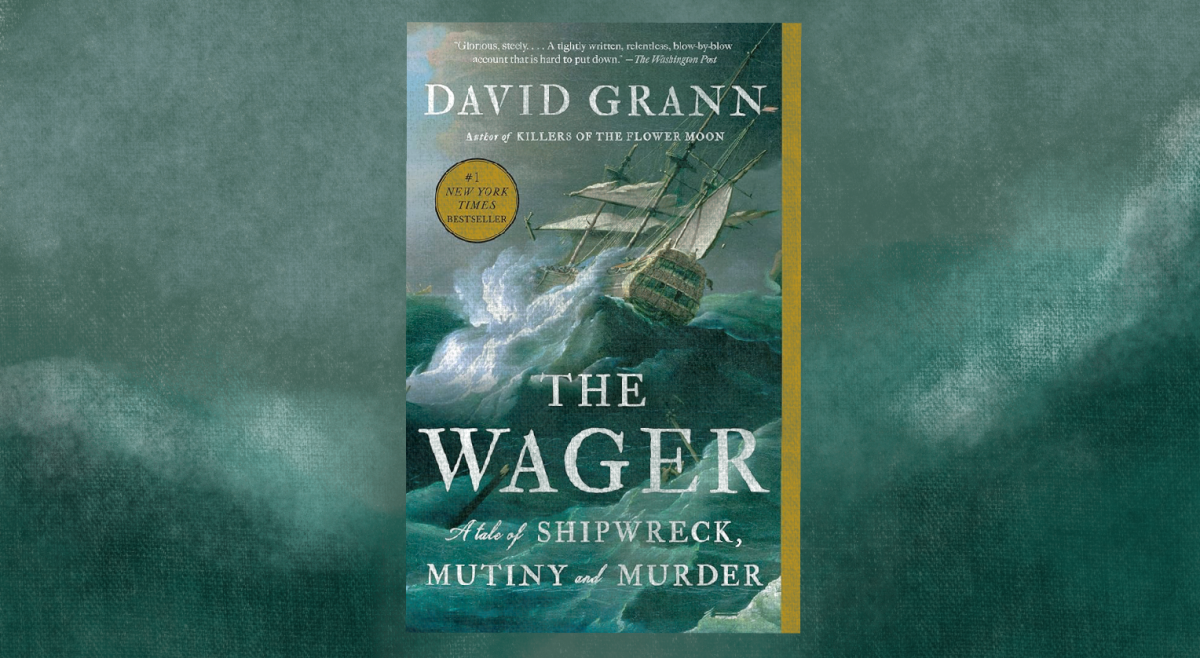
(Jashodhara Jindal / Heights Editor)
★★★★☆
The story of The Wager: A Tale of Shipwreck, Mutiny, and Murder almost seems too outrageous to be real, but that’s exactly what makes it so gripping.
David Grann, whose previous work includes Killers of the Flower Moon and The Lost City of Z, returns with a historical nonfiction narrative that reads with the pace of a thriller and the moral complexity of a 19th-century novel.
Set in the mid-1700s and rooted in a real Royal Navy disaster, The Wager is more than just a tale of survival at sea—it’s a study in imperial ambition, human frailty, and how truth splinters under the pressure of self-preservation.
It’s the kind of historical nonfiction I’d recommend to anyone dipping their toes into the genre. Too often, “nonfiction” carries the reputation of being dry, overly academic, or weighed down by an overzealous devotion to footnotes.
Grann, however, does what few nonfiction writers manage to do well: He delivers the history with a narrative urgency that doesn’t sacrifice the rigor of his research. He expertly walks the fine line between storytelling and dramatization, allowing for sustained historical immersion.
At its core, The Wager recounts the catastrophic journey of a British warship that was pursuing Spanish treasure ships around Cape Horn during the War of Jenkins’ Ear. When the titular ship wrecks off the coast of Patagonia, the crew must navigate the brutal elements and the slow unraveling of order and authority simultaneously. What follows is mutiny, murder, cannibalism, and a haunting return to civilization.
Grann doesn’t just recount what happened—he invites readers into the moral chaos of it. By piecing together court-martial transcripts, personal journals, and naval records, he reveals how history is often a matter of who gets to speak first.
Two distinct groups of survivors return to England with wildly different versions of events, and it’s not long before the shipwreck becomes a stage for competing narratives shaped by ego, political self-interest, and shame.
There’s a subtle elegance in how he layers voice and source with William Bulkeley’s meticulous diary, David Cheap’s stern moral code, and John Byron’s evolving self-presentation. As a history and English major, I found myself drawn to how Grann bridges the meticulousness of historical scholarship with the investigation of humanity that we often associate with literature.
Each character feels vividly realized because Grann trusts the source material enough to let contradiction and nuance shine through instead of inventing their psychology. It’s the perfect intersection of archival accuracy and literary craft.
There’s also a deep pleasure in how The Wager uncovers the linguistic detritus of maritime life. Grann effortlessly weaves the origins of expressions like “under the weather” and “an albatross around one’s neck” into the narrative. They don’t feel shoehorned in like trivia—they serve to deepen the narrative’s historical immersion. It’s proof that language, like history, is shaped by the sea as much as by the land.
Structurally, the book is tightly paced, even as it spans continents, years, and political regimes. Grann’s chapters are short but potent, designed for momentum as opposed to meandering. It’s a wise choice. In a story so saturated with hardship—freezing rain, starvation, dysentery, betrayal—the last thing a reader needs is bloat. The prose is clean, focused, and, at times, beautifully stark. The sensory detail never overwhelms, but it lingers: the rotting sea biscuit, the keening wind off the Patagonian cliffs, the silence of a ship’s deck after a mutiny.
Still, the book isn’t without minor flaws. In rare moments, especially toward the end, the narrative becomes slightly repetitive as the different accounts clash and re-clash in court. These sections are fascinating from a historiographical standpoint, but might test the patience of a reader less invested in the ethical implications of truth-telling.
While it seems Grann intends to let ambiguity stand in place of resolution, there’s a part of me that wanted a tiny bit more insight into what became of these men as the headlines faded and the public moved on.
But maybe that’s the point.
The Wager resists neat endings. It’s not a story of triumph, nor one of simple villainy. It’s about how people justify themselves to others, to history, and to the mirror. Grann suggests that the real mutiny might be against the idea that any single version of a story can ever be entirely true.
In today’s media-saturated landscape, where narratives are spun and re-spun depending on who’s telling them, The Wager feels especially relevant. It’s a cautionary tale about the power of story to either preserve or distort reality, subtly reminding us that surviving the raging sea is only half the battle. The real fight is for the story that gets remembered.
For anyone looking to try historical nonfiction without feeling like they’re adding another item to their exhaustive list of class readings, this is the book I’d hand them. Grann proves that the genre can be as emotionally resonant and narratively dynamic as any novel. Maybe more importantly, he proves that history isn’t just what happened but what we choose to believe.